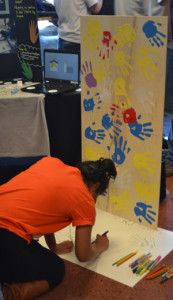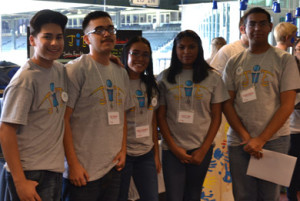Our community is faced with many important issues — and Denver’s students are stepping up to the challenge of finding solutions. On November 5th at Coors Field, Denver Public Schools’ high school students joined together to compete and discuss their solutions to these critical issues. The event, appropriately named, Challenge 5280, provides an opportunity for students’ creativity, teamwork and ingenuity to shine as they strengthen their leadership skills.
Restorative Justice
The Challenge: “The Denver Foundation challenges you to work within your school, neighborhood, and city to build a creative model to address crime. The model should be restorative and fair for all people regardless of race.”

Students join together to create a mural.
Schools participating: Thomas Jefferson (TJ), STRIVE Prep Excel
The Problem: Harsh, zero tolerance policy standards, which result in suspensions, expulsions and arrests, can be life-altering for students. Students who are kicked out of school are more likely to disengage academically, drop out of school, and enter the juvenile justice system.
Students’ Creative Solutions: The team at Thomas Jefferson High School organized a student-led group to engage in restorative conversations to help their peers in need get back on track. They found that peer-led conversations were much more effective than when led by adults, who might not be as relatable. The student group also trained other students in their collective work towards better fighting crime and minor offenses.
STRIVE worked to create a community mural where handprints were used to identify those welcomed back into the community. Students aimed to reverse the traditional practice of fingerprinting people when they’re identified as criminals and thus, excluded from the community. The students discussed that restorative approaches, which address wrong-doing through identifying harm done and creating steps to repair the harm rather than implementing punishment, must start before the high school years. Both groups said they’d be going to middle schools and mentoring students participating in restorative approaches in order to expand their impact even further within their community.

STRIVE Prep Excel’s Student Group
Measurable Impact: Student groups both discussed the positive impact that their actions have already had on their peers. Students in need of righting their mistakes said how helpful it was to have peers to talk with instead of the typical conversations with a counselor or teacher. One student was so moved by the community actions that he decided to apologize in front of his entire school for his poor decisions. Additionally those students who were excelling in school said they were better able to understand the issue and how they could help make a change. Having the idea that it is more important to build up the community instead of casting out people who have made mistakes creates a positive school culture and could impact a student before he/she makes a life-altering decision.
